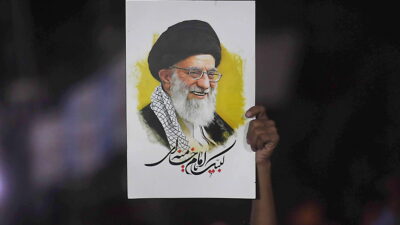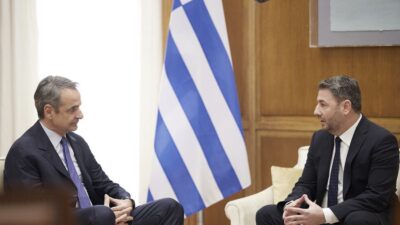Kostas Grivas: Why the exploratory talks also undermine the position of Greece in the West
26/01/2021
In a previous article, the author argued that in the new international system, China does not want and can not act as a successor to the United States. What is happening today is not the change of baton in “world hegemony” from the US to China, but the transition to a multipolar international system, the center of which has shifted to the East.
China welcomes this Asian-centric system, as it seeks, through economic and trade interaction with Asia’s other prosperous economies, to achieve broader geopolitical synergies and to tow even countries that are considered America’s advanced outposts. in the region, such as Australia.
At the same time, China has developed a close partnership with Russia, which aims to tow countries with which it has clearly competitive, even hostile, geopolitical relations. The most important of these are India and Vietnam. These countries are hostile to China, but on the other hand, they have close relations with Russia and it would be very difficult for them to choose to turn against both China and Russia.
Consequently, Beijing believes that through Moscow it will be able to keep these countries on a path, if not friendly, at least tolerant of it. To put it simply, the post-US international system is multipolar, but the growing importance of Asia and the dynamics of the China-Russia system are creating a large geopolitical mass in the Far East.
The geopolitical mass is attracting the rest of the Asian countries, while the economic and geo-economic interactions and fermentations, with most prominent among them, of course, the famous Belt and Road Initiative (new Silk Road), creates a dynamic of aggregation of these countries in the future, pushing the West to the sidelines. Of course, this is something the West wants to prevent. In particular, it wants to keep as many of these countries as possible out of the “pan-Asian” scheme. And the most important of these countries is India.
The role of Greece
At this point, Greece comes to the fore. Greece and India have become very close from a geopolitical point of view due to the fact that both have to face an extremely ambitious Turkey. A Turkey that is trying to create an intermediate space in Central Asia, between West and East, with its own leader and based on Pakistan, India’s great enemy.
Greece can make a significant contribution to the deconstruction of this intermediate space, leading in an anti-Turkish scheme that will start from France, will pass to the two state components of Hellenism (Greece and the Republic of Cyprus) and will continue through Egypt, the Gulf oil monarchies. to reach India.
In this way, not only would a huge geopolitical barrier be created against Turkey, but Greece would be drastically upgraded in the new fluid international system. The interesting thing is that in this way it would acquire an expanded role in the context of Western geostrategy, especially the geostrategy of the USA. And that would be because a geopolitical corridor from France to India would be created, which would keep the latter united with the West and reduce the momentum of its integration into the “pan-Asian” scheme that Beijing is trying to create.
Of course, this is crucial to US geostrategy, which seeks to keep India as a huge bridgehead in Asia and the core of a potentially anti-Chinese axis. At the same time, the deconstruction of Turkey’s ambitions to create a new geopolitical space in Central Asia favors both American, Chinese, and Russian geopolitical strategy.
Exploratory talks
None of these countries wants an overly strong Turkey, which will impose its own agenda. Much more so they do not want an emerging third party between West and East. Of course, if they can not avoid its creation they will try to approach it and tow it to their side, but in principle, it is not desirable for anyone. So Greece could upgrade its operation and role in the strategies of both the US and Russia and China, contributing to the deconstruction of this scheme.
But to operate in this way, certain conditions are required. The most basic of these is knowing what game you are playing. And unfortunately, the Greek system of power does not seem to realize that, whether it wants to or not, Greece is located and operating in a critical area of a unified international system. It does not only interact with Turkey, but with the whole world on the Eurasian chessboard and to upgrade its position in the Western world, it must, above all, accept its existence.
And it seems to be doing just the opposite, promoting a “strategy” of self-elimination. This course is the incomprehensible obsession with the initially deadlocked, and in principle dangerous, infamous “exploratory talks” with Turkey.
Fugitive from history
In these talks, Turkey raises a number of issues that directly affect the hard core of Greek national sovereignty. Even worse, Greece appears to want to make every sacrifice to find a modus vivendi with Turkey. And this can be interpreted that it does not want to function as part of the anti-Turkish group mentioned above and of course that it does not want to take a leading role in the dangerous, but also with great opportunities Eurasian chessboard.
Greece prefers to withdraw and invest in the generosity of the Turks. This means that Greece’s candidate allies will cease to be candidate allies. If they realize that Greece does not even want to defend its national identity, let alone star in an anti-Turkish grouping that would create the model of a new geopolitical entity in the international system, then everyone will go their own way. These palyers will seek other alliances and friendships. Even with Turkey.
A key feature of the current international system is the ambiguity, liquidity and mixed nature of the relationships between the actors. There are no permanent friendships and animosities. Everything can change and change quickly. If the main factor for the implementation of the awe-inspiring rival of the Turkic system of Central Asia, namely Greece, does not want to play its role, the others will follow their own path that may bring them on a trajectory of convergence with Ankara. So some things need to be clarified. If Greece insists on its current sad policy of hiding from history, sooner or later history will find it and then ask it for a reason for its depravity. And the price will be high.





